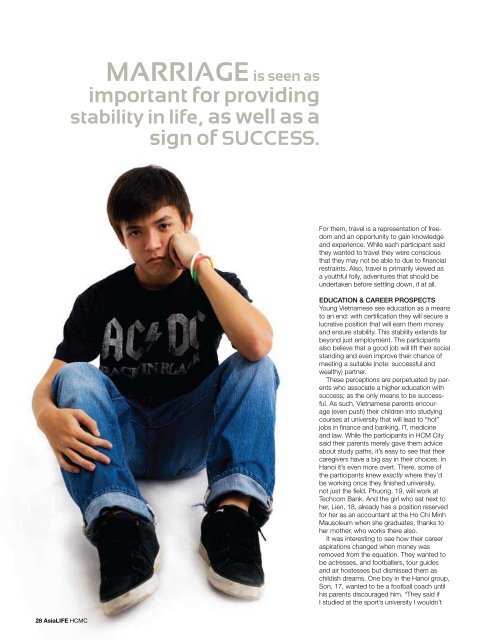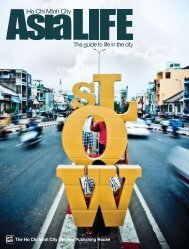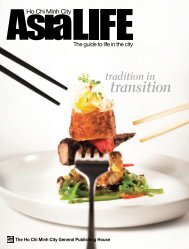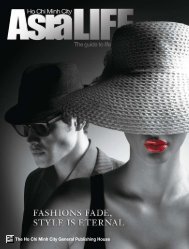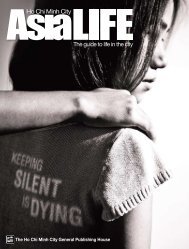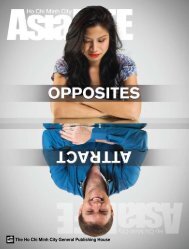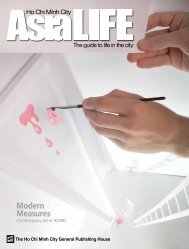Brett Davis - AsiaLIFE Magazine
Brett Davis - AsiaLIFE Magazine
Brett Davis - AsiaLIFE Magazine
You also want an ePaper? Increase the reach of your titles
YUMPU automatically turns print PDFs into web optimized ePapers that Google loves.
MARRIAGE is seen as<br />
important for providing<br />
stability in life, as well as a<br />
sign of SUCCESS.<br />
Young Vietnamese are PRAGMATIC<br />
about EDUCATION, often seeking<br />
courses which will provide JOBS IN<br />
LUCRATIVE industries.<br />
For them, travel is a representation of freedom<br />
and an opportunity to gain knowledge<br />
and experience. While each participant said<br />
they wanted to travel they were conscious<br />
that they may not be able to due to financial<br />
restraints. Also, travel is primarily viewed as<br />
a youthful folly, adventures that should be<br />
undertaken before settling down, if at all.<br />
EDUCATION & CAREER PROSPECTS<br />
Young Vietnamese see education as a means<br />
to an end: with certification they will secure a<br />
lucrative position that will earn them money<br />
and ensure stability. This stability extends far<br />
beyond just employment. The participants<br />
also believe that a good job will lift their social<br />
standing and even improve their chance of<br />
meeting a suitable (note: successful and<br />
wealthy) partner.<br />
These perceptions are perpetuated by parents<br />
who associate a higher education with<br />
success; as the only means to be successful.<br />
As such, Vietnamese parents encourage<br />
(even push) their children into studying<br />
courses at university that will lead to “hot”<br />
jobs in finance and banking, IT, medicine<br />
and law. While the participants in HCM City<br />
said their parents merely gave them advice<br />
about study paths, it’s easy to see that their<br />
caregivers have a big say in their choices. In<br />
Hanoi it’s even more overt. There, some of<br />
the participants knew exactly where they’d<br />
be working once they finished university,<br />
not just the field. Phuong, 19, will work at<br />
Techcom Bank. And the girl who sat next to<br />
her, Lien, 18, already has a position reserved<br />
for her as an accountant at the Ho Chi Minh<br />
Mausoleum when she graduates, thanks to<br />
her mother, who works there also.<br />
It was interesting to see how their career<br />
aspirations changed when money was<br />
removed from the equation. They wanted to<br />
be actresses, and footballers, tour guides<br />
and air hostesses but dismissed them as<br />
childish dreams. One boy in the Hanoi group,<br />
Son, 17, wanted to be a football coach until<br />
his parents discouraged him. “They said if<br />
I studied at the sport’s university I wouldn’t<br />
have a bright future. When asked to define<br />
“bright” he said “wealthy.”<br />
As a whole though, the participants were<br />
pragmatic about education and the opportunities<br />
it will afford them. This pragmatism also<br />
translates into expectations about how they<br />
should be taught.<br />
Most find the Vietnamese education<br />
system to be outdated and too theory-based.<br />
They feel they have few opportunities for<br />
practical application. This goes hand in hand<br />
with their complaints about “old” teachers<br />
and lecturers who don’t explain subject<br />
matter properly and whose knowledge is<br />
perceived to be out of date. While the high<br />
school pupils seem to be relatively happy with<br />
the quality of education they are receiving,<br />
the university students are concerned that<br />
they won’t have the skills to perform in the<br />
workplace after completing their studies,<br />
primarily because the teaching methods<br />
their lecturers employ—often strict and<br />
didactic—are impractical. In addition, they<br />
say Vietnamese syllabuses are old-fashioned<br />
and promote “cramming,” that is, committing<br />
copious amounts of information to memory.<br />
Still, they all view education as essential and<br />
pointed to a number of social evils that a lack<br />
of study could lead to: homelessness, crime<br />
and, interestingly, diseases like HIV.<br />
SEX & RELATIONSHIPS<br />
The moderator, 28-year-old Hieu An, skirted<br />
ever-so-artfully around the s-word before<br />
she dropped the bomb. Previously, there had<br />
been chatter about the importance of marriage<br />
and laughter about 16-year-old HCM<br />
City resident Trong’s desire to one day have<br />
a beautiful wife. But the talk quickly dissolved<br />
and all eyes averted downwards when Hieu<br />
An mentioned sex. Young Trong, in particular,<br />
appeared uncomfortable.<br />
The Saigonites recovered quickly and put<br />
forward their opinions about pre-marital sex.<br />
Loc, 16—who works as a promotion girl at a<br />
supermarket after school—said she believed<br />
sex before marriage was acceptable and was<br />
largely circumstantial. She explained this by<br />
adding that she may have sex while under<br />
the influence of alcohol. The two girls sitting<br />
opposite her, however, 19-year-old university<br />
students Hue and Nhi noted the value of a<br />
woman’s virginity. They also said that premarital<br />
sex was a Western activity, and one<br />
that Vietnamese need not follow.<br />
The boys referred to sex before marriage<br />
as a “movement,” that more young people<br />
aged 14 to 15 were indulging in. They<br />
seemed to think it was OK as long as the<br />
couple were mature enough to cope with the<br />
consequences and considered the health<br />
issues involved. They also had no problems<br />
with couples living together before marriage,<br />
in order to get to know each other before taking<br />
the plunge. Still, they said the likelihood of<br />
them living with their partner before marriage<br />
was slim.<br />
The Hanoians were a different story<br />
and bound far more by convention. Each<br />
participant said that sex before marriage was<br />
unacceptable, a response that TNS Market<br />
Research consultant David Watts said could<br />
be attributed to the importance of “keeping<br />
face” and upholding one’s reputation in the<br />
north. Most thought it was OK to kiss their<br />
boyfriend or girlfriend, but anything more<br />
intimate took the relationship to a new level.<br />
They believed that if a young couple has sex,<br />
they should marry one another. The youngest<br />
participant Dung, 15, said he thought young<br />
couples could live together before marriage<br />
as a way of gauging their compatability. When<br />
prompted for more information though, he<br />
said it wasn’t something he would do, but<br />
he believed it was acceptable behaviour for<br />
others.<br />
Marriageable age varied by gender, not<br />
so much by location. While all participants<br />
said they would get married, males opted to<br />
wed later in their mid-30s, and females said<br />
they expected to walk down the aisle in their<br />
mid- to late-20s. This makes sense as the<br />
boys view themselves as the future breadwinners<br />
of their families, and want to marry only<br />
once they have a stable job and adequate<br />
finances.<br />
Everyone said without hesitation that they<br />
would have children. In both cities having<br />
children is perceived as a way to continue the<br />
family lineage. Both the Saigonese and the<br />
Hanoians said they’d like to have one to three<br />
kids in the future. The group from HCM City<br />
couldn’t really explain how they had arrived<br />
at the figure, but the northerners pointed<br />
directly to Ho Chi Minh’s teaching as their<br />
source. “That’s a statement of Uncle Ho,”<br />
they agreed, referring to the government’s<br />
two child per family policy.<br />
FUTURE AMBITIONS<br />
All of the participants yearn for material<br />
possessions—fashionable motorbikes in<br />
the immediate future and cars and villas as<br />
adults. One boy, 19-year-old university student<br />
Tu, who aspires to be a millionaire, even<br />
wants to own a private plane. To afford the<br />
lifestyle they desire they need money and it<br />
is apparent that cash underpins every critical<br />
decision they make.<br />
Their ambitions reflect the change in<br />
Vietnam’s society. As the nation becomes<br />
more affluent they anticipate that their quality<br />
of life will improve. They expect Vietnam to<br />
develop exponentially and can foresee better<br />
education and healthcare systems, plus<br />
greater collective knowledge, awareness and<br />
understanding. Yet, they are also aware of<br />
the pitfalls of rapid expansion—increasing<br />
population, industrialization, rising land prices<br />
and a widening of the gap between rich and<br />
poor. Ironically, they can also see the cons<br />
of living to work, the very lifestyle they are<br />
gearing themselves for—the degradation of<br />
the family and reduced social life. And with<br />
multi-generational living situations on the<br />
downward slide, they predict a diminishing<br />
sense of community and social responsibily.<br />
Recurrent throughout the entire project<br />
was this sense of confusion. Vietnamese<br />
youth are torn between a desire for progress<br />
and modernity, yet they are worried about<br />
what may be lost if the country’s traditions are<br />
not maintained. They’re still not exactly sure<br />
what they want.<br />
28 asialife HCMC asialife HCMC 29


